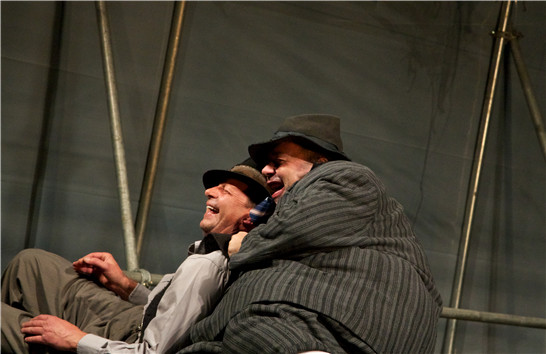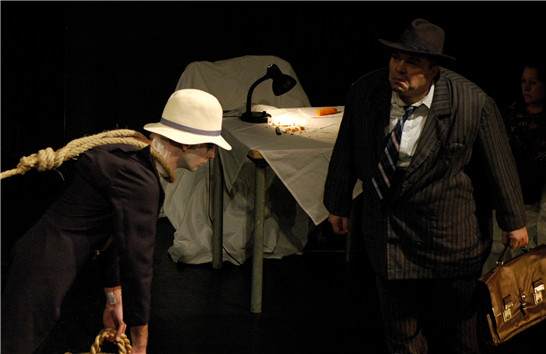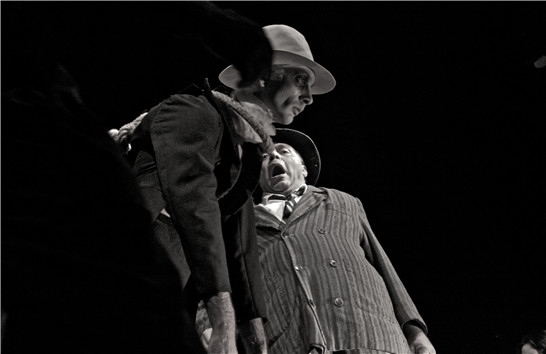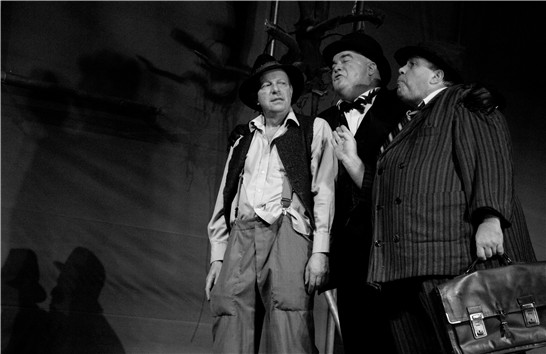Romania
Radu Stanca National Theatre from Sibiu
Directed by Silviu Purcarete
Written by Samuel Beckett
WHEN:
19th Oct. 2018, 18:30
20th Oct. 2018, 18:30
21st Oct. 2018, 18:30
WHERE: Exhibition Hall 4
Duration: 120 minutes (without intermission)
Performed in Romanian, with Chinese and English subtitles

Reviews
Always on the edge between real dialogue and slipping into the unreal, the irrational, the virtual, the dream. In this production, Beckett’s play has a kind of cinematic staging. A journey of short, abrupt strokes, which more obviously mark the swerve towards fiction, towards the imagination of the two. Towards the hallucinating oscillations between essence and appearances.
— Marina Constantinescu, Ziarul Metropolis
At one end of the scale is the revival of a famed international classic, Waiting for Godot, featuring two of Romania’s most respected actors, and directed by the internationally acclaimed director Silviu Purcarete.
— The Guardian
The irony à la Purcărete, always deeply infiltrated in the performances’ fibre, the quotes and the completely natural and unabashed way of treating the dramaturgic material, the vague and amused air of its creator, enter the Waiting for Godot performance in the stage “print” series of Purcărete, which heavily colors Romanian theatre, which generally suffers from masterpiece obsession induced constipation.
— Cristina Modreanu, Liternet
Two people who seem to have remained alone on Earth. The only survivors of an apocalypse. The Apocalypse of waiting. Of lonesomeness. Of unfulfillment. Of fear of the world and themselves. In Purcărete’s performance, Samuel Beckett’s tramps, Vladimir and Estragon, a sort of tragic Stan and Bran, feverishly wait. A too-fat Estragon (Constantin Chiriac), who struggles to take his shoes on and off, is seconded by a gaunt Vladimir (Marian Râlea) who seems defeated by illness and fear. Divine music by Schubert accompanies the announcement made by a child to the two: “No, sir!” Godot is still not arriving… Waiting and waiting, and everything is for nothing.
— Ema Nicola, SensoTV

About Waiting for Godot (Aşteptându-l pe Godot)
Waiting for Godot (Aşteptându-l pe Godot) is not a play with a thesis, it does not enforce any moral on the audience, and it does not hide within itself any particular hope.
In order to understand such a play, one has to see the world as large as one’s own spirit, and the two tramps as a symbol of an always ambivalent humanity.
Beckett does not reveal to us the meaning of the events, which we are always looking for, but demonstrates his technical ingenuity by playing with our expectations. Waiting for Godot (Aşteptându-l pe Godot) has the power of infinite adaptability. The play speaks about feelings and emotions left unspoken until now, but with Beckett as a guide, we are able to recognize them as our own. Waiting for Godot (Aşteptându-l pe Godot): an invocation, a reflection, a curtain...
About Silviu Purcarete
Silviu Purcarete is one of the best known Romanian directors, who has worked for the most important theatres in Romania (Sibiu, Craiova, Bucuresti, Cluj Napoca), as well as for theatres in Great Britain, (Royal Shakespeare Company, Nottingham Playhouse), Austria (Burgtheater), France (Théâtre De L'union-Limoges), Luxembourg, Norway (National Theatre of Bergen, Det Norske Teatret-Oslo), Portugal (Teatro Nacional - San Joao) and Hungary (Katona Joszef Theater).
Because of his exceptional artistic work he was awarded the Chevalier des Arts et des Lettres order in France, while in Romania he received the Star of Romania Order Medal. He plied his talents in the position of General Manager of the Bulandra Theatre in Bucharest and, for seven years, of the Centre Dramatique National de la Limoges. With his extraordinary production ofFausthe was part of the programs Bologna-Prague European Cultural Capital of Europe and in the Sibiu European Capital of Culture.
His success and mastery of the art of directing has given him the opportunities to collaborate with opera houses such as Opera Bonn, National Welsh Opera, Wiener Staatsoper, Scottish Opera, Opera Essen. In addition, his performances have been seen all over the world on the most important stages at the greatest festivals, such as Edinburgh, Avignon, Tokyo, Melbourne, Montreal, Glasgow, Bath, Varna, Gdansk, and more.
In 2012 was released Somewhere in Palilula, Silviu Purcarete’s film debut.
Credits
Written by Samuel Beckett
Director, Scenography: Silviu Purcărete
Cast: Constantin Chiriac – Estragon (Gogo)
Marian Râlea – Vladimir (Didi)
Cristian Stanca - Pozzo
Pali Vecsei - Lucky
Andrei Văcariu - The Boy
Piano: Monica Florescu
Cello: Makcim Fernandez Samodaiev;
Violin: Sergiu Cosmin Fidileș
About Radu Stanca National Theatre
Radu Stanca National Theatre has been the “tradition continuer” of theatre for almost five centuries in Sibiu and in the region. Along with the International Theatre Festival in Sibiu, its unique productions have succeeded in garnering the title of European Capital of Culture Sibiu in 2007 with a repertory of more than 85 different productions, from Greek tragedy to the most innovative experiments of the 21st century. Radu Stanca National Theatre collaborates with the leading Romanian and International directors: Silviu Purcărete, Andrei Şerban, Andriy Zholdak, Kushida Kazuyoshi, Armin Petras, Rodrigo Garcia, Mihai Măniuţiu, Tompa Gábor, Alexandru Dabija, Claire Dancoisne, Charles Muller, Yury Kordonsky, Radu Alexandru Nica, Robert Raponja, Masahiro Yasuda, Eugenio Barba, Gigi Căciuleanu, Dragoş Galgoţiu, Zoltán Balázs and Levan Tsuladze. Radu Stanca National Theatre shows have been invited to the world’s most important festivals, in Edinburgh, Avignon, Brussels, Rome, Tokyo, Seoul, St. Petersburg, Moscow, Naples, Paris, Merida, Liverpool, London, Budapest, Tampere, Poznan, Warsaw, Cologne, Freiburg, Barcelona, Lisbon, Porto, Cairo, Yerevan, Tbilisi, Nitra, Athens, Thessaloniki, Belgrade, Varna, Pécs, Lille, Tel Aviv, Omsk, Chisinau and Sarajevo.







